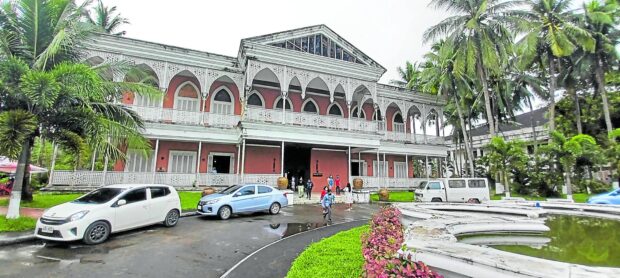In Tacloban, sequestered Marcos properties now tourist sites

REPOSITORY OF ICONS The Santo Niño Shrine and Museum in Tacloban City, as shown in this photo taken in January, contains religious icons made of ivory, among others. —Chris Firmo/CONTRIBUTOR
TACLOBAN CITY—The Presidential Commission on Good Government (PCGG) has leased out to a private corporation two sequestered properties of the Marcos family here for P150,000 a month.
The Santo Niño Shrine and Museum and the People’s Center and Library—two properties built by former first lady Imelda Romualdez Marcos during her husband’s reign in the 1970s—contained religious artifacts, paintings and rare books and manuscripts. They have become favorite destinations for tourists visiting this capital city of Leyte province.
The two properties are currently being managed by the the privately run Center for the Development of Sustainable Communities for Social Progress (CDSCP), which also won the contract to lease the two assets. CDSCP collects entrance fees from those visiting the facilities.
Noemi Duarte, the PCGG representative in Eastern Visayas, said the contract of lease between CDSCP and the PCGG took effect on April 1. The agreement is good for one year but is subject to renewal.
“CDSCP has leased the (properties) for a year at P150,000 per month. Under the agreement, all 18 employees shall be retained,” she said in an interview on Monday.
Article continues after this advertisementCDSCP is owned by Dan Stephen Palami who ran for mayor of Tacloban City in the 2007 elections but lost to Mayor Alfred Romualdez, the nephew of Imelda.
Article continues after this advertisementIll-gotten wealth
The two sequestered properties that the Marcos family is claiming to be theirs have been tagged by the government as part of the family’s alleged ill-gotten wealth accumulated during the 20-year rule of Ferdinand Marcos Sr., the father and namesake of the incumbent President.
Duarte said he welcomed the decision of the PCGG to lease the two controversial properties so they would be given a facelift.
Due to legal constraints, Duarte said they could not just implement some renovations to the edifices which were simultaneously constructed from 1979 to 1981.
“Even to procure a bulb for a chandelier, we have to ask permission from Manila. At least now, [we] can do some renovations and improvements,” she said.
Duarte, however, stressed that any major renovation would still need permission from the PCGG central office in Manila since the two properties are owned by the government.
Planned renovation
Palami, in a local television interview on Monday, said they decided to lease the two properties since they continue to be among Tacloban’s top tourist destinations.
“Let us not politicize this issue. The properties are considered as iconic destinations in the city. I hope Madame (Marcos) will be happy with our planned renovations,” he said.
Palami declined to reveal how much CDSCP has set aside for the renovations but revealed that renovating the Santo Niño Shrine and Museum alone would take about P100 million. The Santo Niño Shrine and Museum contained religious icons made of ivory, paintings by noted artists and a chair said to have been used by then Pope and now St. John Paul II during his visit to the Philippines in 1981. It also has an Olympic-size swimming pool and a state dining room on the second floor. Each of its 21 rooms has a motif depicting the country’s regions.
The People’s Center and Library houses around over a million books, magazines and manuscripts.
Built in 1979, the two-story edifice used to serve as a venue for social gatherings, concerts, and important events when Imelda, a native of Tacloban, was first lady.
When Marcos Sr. was ousted in 1986, the property was sequestered by the PCGG, an agency created to recover the ill-gotten wealth accumulated by Marcos Sr., his immediate family, relatives, subordinates and close associates, whether in the Philippines or abroad.
READ:
Ex-political detainee slams Marcos’ plan to recover ill-gotten wealth
Sandiganbayan junks yet another ill-gotten wealth case against Marcos Sr.